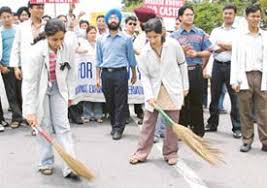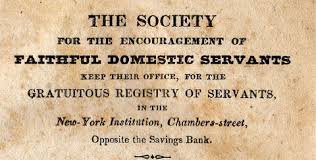There was a rather shocking
newsreport in
The Hindu a couple of days
ago. The report indicated that the sad story of the widows of Vrindavan often
does not end with their death. On the contrary it continues beyond, since there
are no provisions, at least in two of the Government sponsored institutions, for
the last rites of these destitute women. The result of this gap is that their
corpses are carried away by sweepers, cut into pieces, and then disposed of in
jute bags.

What was also shocking however
was the tone of the first of paragraphs of this report, that, after reporting
on the fact, thought fit to mention, that “This, too, is done only after the
inmates give money to the sweeper!” In making this statement, the report added
one more figure to the list of villains of the piece. There was, the families
of these women, who abandoned or forced these women to destitute existence; the
proprietors of the homes they live in; the organizations set up to care for
these women; and finally, the sweepers who dispose of the bodies. And yet,
because they are the final link of this chain of shame, the sweepers appear as
the greatest villains of all. The sweepers are villainous here, since they seem
to lack the basic humanity of disposing of the body without asking for what,
this sentence suggests, is essentially a bribe.

The question that we need to ask
however is why is it that the sweeper is being effectively asked to bear the
burden of humanity that has been shrugged off by the rest of society? Why was
no thought given to the fact that in addition to take on a responsibility that
is not a part of the services they offer as part of their contract of employment,
by taking on the responsibility to discard the corpse the humanity of the
sweeper is in effect compromised by the fact of their having to cut up a human
corpse like it were that of an animal? Catering to the dead is often seen as a
mark of respect to the dead. However, it can also be thought of as catering to
the sentiments of the living. By treating the dead as if they were still alive,
we renew in the living the sense of value to life and the human body. By having
to dispose of the bodies of the widows in this manner, it is not just the
widows, but the sweepers as well who are effectively being dehumanized.

The reason these questions were
not asked by the reporter who penned the story, is perhaps because of the space
the wielder of the broom holds in our society. The position of the sweeper is
not an open category job opportunity. It falls within the reserved category. It
is reserved often for those that are deemed untouchable, or nearly untouchable.
This fact was strikingly demonstrated in the course of the protests by
upper-caste participants against the Mandal Commission’s recommendations, as
well as general protests against reservation. The message they sought to
transmit, was that thanks to this policy of reservations, they would be unable
to gain respectable jobs as engineers and doctors, and have to take up the
shameful jobs of being sweepers. The broom then, was a mark of shame, while at
the same time indicating that there exists no need for us to necessarily
respect, or treat as humans, those who generally wield the broom.
There have been other uses of the
broom however, where there is an attempt to use the symbol of the broom as a
positive element. Very often though, these uses have not detracted from the
generally negative symbolic value of the broom. On the contrary, they rely on
the negative connotation that the broom generally holds in our society. An
example of this was the use of the broom in a recent art installation by Raj
Bhandare, a Goan artist, in favour of Hazare’s movement against corruption.
Titled ‘Anna Logue’ the installation referenced the ‘shit’ that the country was
in, and incorporated into the work, a number of elements necessary for us to
resolve the problem. One of these elements was the broom, incorporated as an
‘an appeal to one and all that we need to take it up upon us to Cleanse
the System.’ In this arrangement, the broom gains importance primarily because
it is ‘us’ respectable folk, who are taking it up. It is clear from the
installation’s phrasing of the broom element, that the citizens do not normally
take up the broom, that the taking up of the broom is an extra-ordinary
circumstance, and it is for the general benefit of society that we must now
debase ourselves to clean up the shit that we may have contributed to. In sum,
the power of our action lies because of the negative value that is normally
associated with the broom and the everyday, or ordinary, wielder of the broom.

The wielder of the broom then is
often not understood to be human. The place of the wielder of the broom is to
do their job, and their job is not regarded as the list of duties set out
within a contract of employment. No, their job is to serve, without question.
If this servant asks for reimbursement for extra services rendered, that is to
say, demand their right, the response of the rest of the system is to sit back
in shock. This demand is seen as the demand for a bribe, it is seen as
corruption.

Since the past few weeks, it
appears as if the Hazare saga has come, or will eventually come to an end.
However, regardless of the presence of Hazare, the unquestioning attitude as to
what comprises corruption continues. At the height of the Hazare mania that
overtook the country, asking these questions was tantamount to justifying
corruption. Perhaps it would now be a more convenient time to interrogate
ourselves on what is our understanding of corruption, and if our notions of
corruption, like those of the reporter for
TheHindu, are not twined with a morality that stems from our own limited
upper-strata of society locations.
(A version of this post was first published in the Gomantak Times 12 Jan 2012)
 Since the past few weeks, it
appears as if the Hazare saga has come, or will eventually come to an end.
However, regardless of the presence of Hazare, the unquestioning attitude as to
what comprises corruption continues. At the height of the Hazare mania that
overtook the country, asking these questions was tantamount to justifying
corruption. Perhaps it would now be a more convenient time to interrogate
ourselves on what is our understanding of corruption, and if our notions of
corruption, like those of the reporter for TheHindu, are not twined with a morality that stems from our own limited
upper-strata of society locations.
Since the past few weeks, it
appears as if the Hazare saga has come, or will eventually come to an end.
However, regardless of the presence of Hazare, the unquestioning attitude as to
what comprises corruption continues. At the height of the Hazare mania that
overtook the country, asking these questions was tantamount to justifying
corruption. Perhaps it would now be a more convenient time to interrogate
ourselves on what is our understanding of corruption, and if our notions of
corruption, like those of the reporter for TheHindu, are not twined with a morality that stems from our own limited
upper-strata of society locations.

No comments:
Post a Comment